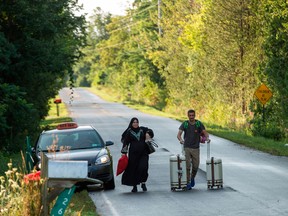Canada’s immigration department ‘forgave’ over 17,500 foreigners’ criminal convictions over 11-year span
https://www.rebelnews.com/liberals_allowed_over_17_000_known_foreign_criminals_into_canada_over_11_year_span
Since 2013, Canada has deemed 17,500 foreigners with criminal convictions “rehabilitated” for entry, but a lack of transparency on forgiven crimes has raised vetting concerns amid security failures.
![]()
Rebel News | July 02, 2025 | News | 3 Comments

Despite foreigners being prohibited from entering the country if they’ve been found guilty of an act that’s considered a criminal offence in Canada, new reporting shows that over the previous 11 years, 17,500 foreigners have had their criminal convictions ‘forgiven.’
Immigration, Refugees and Citizenship Canada (IRCC) has the power to grant exceptions if more than five years have passed since an individual was convicted of a crime or finished their sentence in their home country, as reported by the Globe and Mail.
Through the use of this power, government figures show that IRCC has labelled 17,500 foreigners as “rehabilitated” following their crimes, meaning they can apply to enter Canada as a permanent resident, tourist, or through a work or student visa.
The immigration department reportedly looks at applicants’ behaviour since their conviction(s), the seriousness of their crime(s), and “the support they receive in the community” when making a decision on whether to approve applications for rehabilitation.
https://platform.twitter.com/embed/Tweet.html?dnt=false&embedId=twitter-
Despite admitting to ‘forgiving’ over 17,500 foreigners’ convictions since 2013, IRCC has not provided any information about the nature of the crimes committed.
Conservative immigration critic Michelle Rempel Garner condemned the lack of transparency from IRCC about the types of convictions that have been forgiven, adding that the department must take new steps “if the public is going to have any confidence in the immigration system’s vetting process.”
“There have been questions about the adequacy of vetting of many classes of people entering Canada,” she said.
It is currently unclear exactly how many of the foreigners who had their convictions forgiven were able to successfully enter Canada. “Receiving approval to overcome a criminal inadmissibility is only one part of determining whether or not a person can enter or remain in Canada,” said IRCC spokesperson Nancy Caron.
”Once they have been approved for rehabilitation, they will need to meet the requirements for applicants seeking entry as a temporary resident or permanent resident,” she added.
Canada’s immigration vetting practices have faced increasing scrutiny after a father and son, who both faced national security screenings, were granted citizenship before planning a terrorist attack in Toronto. Ahmed Fouad Mostafa Eldidi and his son, Ahmed Fouad Mostafa Eldidi, were charged last year with conspiracy to commit murder for the benefit or at the direction of a terrorist group among other charges.(Rebel News, July 2, 2025)
COMMENT:
Seems clear the Liberals are taking pages out of Communist Playbook..unleashing the criminal element into society to spread fear and thus keep the law- abiding population even more under control. We’ve seen how just one criminal can have a looooonngg rap sheet.

